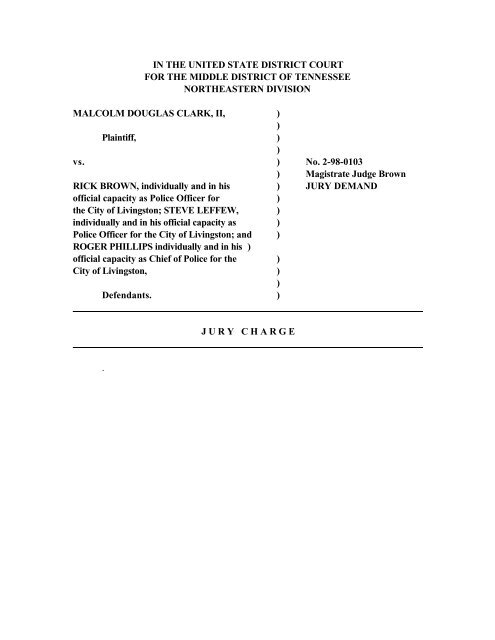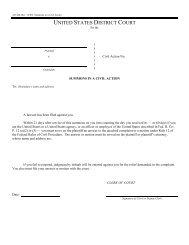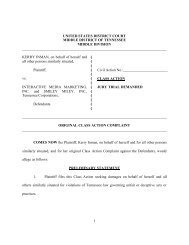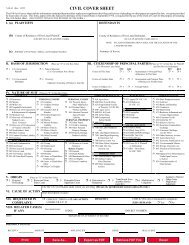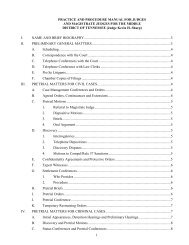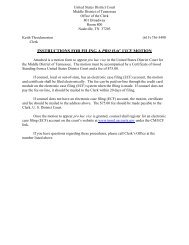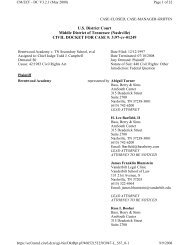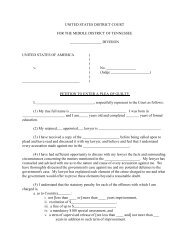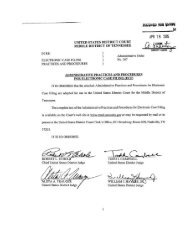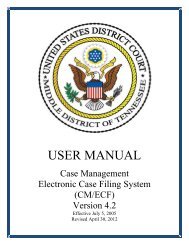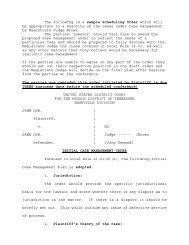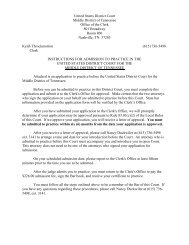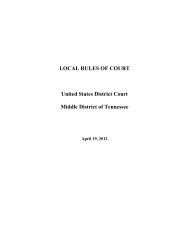Civil Jury Instructions - US District Court Middle District of Tennessee
Civil Jury Instructions - US District Court Middle District of Tennessee
Civil Jury Instructions - US District Court Middle District of Tennessee
You also want an ePaper? Increase the reach of your titles
YUMPU automatically turns print PDFs into web optimized ePapers that Google loves.
IN THE UNITED STATE DISTRICT COURT<br />
FOR THE MIDDLE DISTRICT OF TENNESSEE<br />
NORTHEASTERN DIVISION<br />
MALCOLM DOUGLAS CLARK, II, )<br />
)<br />
Plaintiff, )<br />
)<br />
vs. ) No. 2-98-0103<br />
) Magistrate Judge Brown<br />
RICK BROWN, individually and in his ) JURY DEMAND<br />
<strong>of</strong>ficial capacity as Police Officer for )<br />
the City <strong>of</strong> Livingston; STEVE LEFFEW, )<br />
individually and in his <strong>of</strong>ficial capacity as )<br />
Police Officer for the City <strong>of</strong> Livingston; and )<br />
ROGER PHILLIPS individually and in his )<br />
<strong>of</strong>ficial capacity as Chief <strong>of</strong> Police for the )<br />
City <strong>of</strong> Livingston, )<br />
)<br />
Defendants. )<br />
________________________________________________________________________<br />
J U R Y C H A R G E<br />
________________________________________________________________________<br />
.
TABLE OF CONTENTS<br />
I. Introduction...........................................................................................1<br />
II. Jurors’ Duties......................................................................................2<br />
III. Theories <strong>of</strong> the Parties........................................................................3<br />
(1) The Plaintiff’s Theory................................................................3<br />
(2) The Defendant’s Theory.............................................................4<br />
IV. Burden <strong>of</strong> Pro<strong>of</strong>.................................................................................6<br />
V. Substantive Law..................................................................................7<br />
VI. Damages..........................................................................................11<br />
VII. Punitive Damages............................................................................13<br />
VIII. General Rules................................................................................14<br />
(1) Evidence Defined.....................................................................14<br />
(2) Consideration <strong>of</strong> Evidence........................................................15<br />
(3) Direct and Circumstantial Evidence............................................15<br />
(4) Evidence for a Limited Purpose.................................................16<br />
(5) Depositions - Use as Evidence..................................................16<br />
(6) Credibility <strong>of</strong> Witnesses............................................................17<br />
(7) Expert Testimony.....................................................................19<br />
(8) Potential Witnesses and Exhibits...............................................20<br />
(9) Statements <strong>of</strong> Counsel..............................................................20<br />
(10) Lawyers’ Objections...............................................................21<br />
IX. Deliberations and Verdict..................................................................22<br />
(1) Introduction.............................................................................22<br />
(2) Experiments, Research, and Investigation..................................23<br />
(3) Unanimous Verdict...................................................................23<br />
(4) Duty to Deliberate.....................................................................24<br />
(5) <strong>Court</strong> Has No Opinion..............................................................25<br />
ii
I. Introduction<br />
Members <strong>of</strong> the jury, you have now heard all the evidence in the case, as<br />
well as the closing arguments. Now it is time for me to instruct you about the<br />
law that you must follow in deciding this case. I will start by explaining your<br />
duties as jurors; then, I will explain the theories <strong>of</strong> the parties; then, I will explain<br />
certain principles <strong>of</strong> law; then, I will explain the elements <strong>of</strong> the Plaintiff's claims;<br />
then, I will explain the Defendant's defenses to the Plaintiff's claims; then, I will<br />
explain certain general rules that apply in every civil case; and last, I will explain<br />
the rules that you must follow during your deliberations in the jury room, and<br />
the possible verdicts that you may return.<br />
Please listen carefully.<br />
1
II. Jurors' Duties<br />
You have two main duties as jurors. The first one is to decide what the<br />
facts are from the evidence that you saw and heard here in <strong>Court</strong>. Deciding what<br />
the facts are is your job, not mine, and nothing that I have said or done during<br />
this trial was meant to influence your decision about the facts in any way.<br />
Your second duty is to take the law that I give you and apply it to the<br />
facts. It is my job to instruct you about the law, and you are bound by the oath<br />
that you took at the beginning <strong>of</strong> the trial to follow the instructions that I give<br />
you, even if you personally disagree with them. This includes the instructions<br />
that I gave you before and during the trial and these instructions. All the<br />
instructions are important, and you should consider them together as a whole.<br />
The parties have talked about the law during their arguments. But if what they<br />
said is different from what I say, you must follow what I say. What I say about<br />
the law controls.<br />
Perform these duties fairly. Do not let any sympathy or prejudice that you<br />
may feel toward one side or the other influence your decision in any way.<br />
2
III. Theories <strong>of</strong> the Parties<br />
I will now instruct you on the specific claims and defenses made by the<br />
parties in this case and the law that applies to the case. As members <strong>of</strong> the jury,<br />
it is your duty to determine the facts and consider whether they support the<br />
theories <strong>of</strong> the Plaintiff or the theories <strong>of</strong> the Defendant. In reaching your<br />
conclusions, you are to apply the rules <strong>of</strong> law that I provide, to the facts you<br />
ascertain from the evidence which has been presented in <strong>Court</strong>.<br />
(1) The Plaintiff's Theory<br />
The following is the Plaintiff’s theory <strong>of</strong> the case.<br />
The Plaintiff was sitting in his car on the courthouse square along with<br />
Brian Keith Karper late one evening in the City <strong>of</strong> Livingston. Officer Brown<br />
pulled in behind the Plaintiff's car, and accused him <strong>of</strong> blowing his horn, which<br />
was allegedly against the law in the City <strong>of</strong> Livingston. Smelling alcohol on the<br />
Plaintiff's breath, Officer Brown demanded the Plaintiff to submit to field<br />
sobriety tests. Officer Brown then determined the Plaintiff should be arrested<br />
and proceeded to take him into custody. By this time, Officer Leffew had driven<br />
up to the scene and assisted Officer Brown in seizing the body <strong>of</strong> the Plaintiff.<br />
During the process <strong>of</strong> arresting the Plaintiff, Officer Brown injured the Plaintiff's<br />
thumb, and Officer Leffew sprayed the Plaintiff with mace. The Plaintiff<br />
3
contends that the actions <strong>of</strong> the Defendants were unnecessary, unreasonable,<br />
and an excessive use <strong>of</strong> force under the circumstances, which is a clear<br />
violation <strong>of</strong> the Fourth Amendment.<br />
(2) The Defendant's Theory<br />
The following is the Defendant’s theory <strong>of</strong> the case.<br />
Defendants contend that the minimal force used to accomplish Plaintiff’s<br />
arrest was reasonable and justified under the circumstances. Plaintiff was<br />
intoxicated and had failed a field sobriety test. He had lied to Officer Brown.<br />
He was uncooperative, belligerent and hostile towards Officer Brown. He<br />
refused to place his hands behind his back, despite being asked to do so by<br />
Officer Brown on several occasions. Officers Brown and Leffew had no<br />
choice under the circumstances but to use physical force to place Plaintiff in<br />
custody. When they were unable to force Plaintiff’s hands behind his back<br />
using physical force, Officer Brown was justified in using pepper spray against<br />
Plaintiff. Neither Officer struck Plaintiff at any time, or used any more force<br />
than was reasonable or necessary to protect themselves and place Plaintiff in<br />
custody.<br />
Chief Roger Phillips had absolutely no involvement in the altercation<br />
between Plaintiff and the two <strong>of</strong>ficers. He had no idea that the incident even<br />
4
occurred until the following Monday. Chief Phillips does not believe that<br />
Officers Brown or Leffew did anything wrong. Nevertheless, he cannot be held<br />
liable for their actions under federal law.<br />
5
IV. Burden <strong>of</strong> Pro<strong>of</strong><br />
Now that you have heard the parties' respective theories, there are several<br />
principles <strong>of</strong> law that I must explain to you. You must apply these rules <strong>of</strong> law<br />
to the facts as you find them.<br />
The Plaintiff has the burden <strong>of</strong> pro<strong>of</strong> in this case. The party who has the<br />
burden <strong>of</strong> pro<strong>of</strong> must carry that burden by a preponderance <strong>of</strong> the evidence.<br />
This means, simply, the greater weight <strong>of</strong> the evidence. It may be helpful to<br />
envision a set <strong>of</strong> balancing scales. After considering all the pro<strong>of</strong> on a particular<br />
element <strong>of</strong> the Plaintiff's case, the scales must be tipped in favor <strong>of</strong> the Plaintiff<br />
on that issue, be it ever so slightly, for the Plaintiff to prevail on that issue.<br />
A preponderance <strong>of</strong> the evidence, thus, means such evidence as, when<br />
considered and compared with that opposed to it, has more convincing force<br />
and produces in your minds a belief that what is sought to be proved is more<br />
likely true than not true. In determining whether any fact in issue has been<br />
proved by a preponderance <strong>of</strong> the evidence, you may consider the testimony<br />
<strong>of</strong> all the witnesses, regardless <strong>of</strong> who may have called them, and all the exhibits<br />
received in evidence, regardless <strong>of</strong> who may have produced them.<br />
6
V. Substantive Law<br />
In this case, the Plaintiff has brought a cause <strong>of</strong> action against the<br />
Defendants under a federal statute called 42 U.S.C. § 1983. Section 1983 <strong>of</strong><br />
Title 42 <strong>of</strong> the United States Code provides that any citizen may seek redress<br />
in this court by way <strong>of</strong> damages against any person who, under color <strong>of</strong> state<br />
law or custom, intentionally deprives that citizen <strong>of</strong> any rights, privileges, or<br />
immunities secured or protected by the constitution or laws <strong>of</strong> the United<br />
States.<br />
In order to prove his claim under this statute, the plaintiff must establish<br />
by a preponderance <strong>of</strong> the evidence each <strong>of</strong> the following elements:<br />
(1) the defendant intentionally committed acts which operated to deprive<br />
the plaintiff <strong>of</strong> a right secured by the Constitution <strong>of</strong> the United States;<br />
(2) the defendant acted under color <strong>of</strong> the authority <strong>of</strong> the State <strong>of</strong><br />
<strong>Tennessee</strong>; and<br />
(3) that the defendant's acts were the legal cause <strong>of</strong> the plaintiff's<br />
damages.<br />
In this case you are instructed that the defendant was acting under color<br />
<strong>of</strong> state law at the time <strong>of</strong> the acts complained <strong>of</strong>. The parties have stipulated<br />
that this element has been established. The plaintiff alleges that the defendant<br />
7
used excessive force in arresting him. You must determine whether the Plaintiff<br />
has proved by a preponderance <strong>of</strong> the evidence that Officer Brown and/or<br />
Officer Leffew used excessive force when they arrested the Plaintiff.<br />
In making a lawful arrest, an <strong>of</strong>ficer has the right to use such force as is<br />
necessary under the circumstances to complete the arrest. However, the use <strong>of</strong><br />
force by <strong>of</strong>ficers simply because the subject is argumentative or contentious is<br />
illegal. A lack <strong>of</strong> provocation or need to use force would make any use <strong>of</strong> force<br />
excessive. The use <strong>of</strong> more force than is necessary or <strong>of</strong> force for an improper<br />
purpose is illegal.<br />
You must determine whether the force used in making the arrest <strong>of</strong> the<br />
plaintiff was unnecessary, unreasonable or excessively violent. The force used<br />
in making an arrest is unnecessary, unreasonable or excessively violent if the<br />
arresting <strong>of</strong>ficer exceeded that degree <strong>of</strong> force which a reasonable and prudent<br />
law enforcement <strong>of</strong>ficer would have applied in making the arrest under the same<br />
circumstances.<br />
The proper application <strong>of</strong> this standard requires a careful attention to the<br />
facts and circumstances <strong>of</strong> the particular case, including the severity <strong>of</strong> the<br />
crime at issue, whether the suspect poses an immediate threat to the safety <strong>of</strong><br />
the <strong>of</strong>ficers or others, and whether he is actively resisting arrest or attempting<br />
8
to evade arrest by flight. For example, an <strong>of</strong>ficer's reasonable use <strong>of</strong> force to<br />
overcome resistance to arrest does not violate a person’s Fourth Amendment<br />
rights even if injury results from the use <strong>of</strong> force.<br />
The reasonableness <strong>of</strong> a particular use <strong>of</strong> force must be judged from the<br />
perspective <strong>of</strong> a reasonable <strong>of</strong>ficer on the scene, rather than with the 20/20<br />
vision <strong>of</strong> hindsight, allowing for the fact that police <strong>of</strong>ficers are <strong>of</strong>ten forced to<br />
make split-second judgments-- in circumstances that are tense, uncertain, and<br />
rapidly evolving--about the amount <strong>of</strong> force that is necessary in a particular<br />
situation.<br />
This reasonableness inquiry is an objective one: the question is whether<br />
the <strong>of</strong>ficer's actions are objectively reasonable in light <strong>of</strong> the facts and<br />
circumstances confronting them, without regard to their underlying intent or<br />
motivation.<br />
In addition to his claims against police <strong>of</strong>ficers whom the plaintiff claims<br />
violated his constitutional rights, the plaintiff is suing their superior <strong>of</strong>ficer, the<br />
chief <strong>of</strong> police, Roger Phillips. In order to find Chief Roger Phillips liable to the<br />
Plaintiff for his damages, you must find that he personally directed, or had<br />
actual knowledge <strong>of</strong> and acquiesced in the constitutional violation. You may<br />
9
not find him liable simply by virtue <strong>of</strong> his position as the superior <strong>of</strong> <strong>of</strong>ficers<br />
Brown and Leffew.<br />
10
VI. DAMAGES<br />
If you find that the defendants are liable, you must award the amount you<br />
find by a preponderance <strong>of</strong> the evidence to be full and just compensation for<br />
all <strong>of</strong> the plaintiff's damages. You also will be asked to determine if the<br />
Defendant is liable for punitive damages, and, if so, you will be asked to fix the<br />
amount <strong>of</strong> those damages. Because the method <strong>of</strong> determining punitive<br />
damages and compensatory damages differ, I will instruct you separately on<br />
punitive damages. The instructions I now give you apply only to your award,<br />
if any, <strong>of</strong> compensatory damages. Compensatory damages are not allowed as<br />
a punishment against a party. Such damages cannot be based on speculation,<br />
for it is only actual damages—what the law calls compensatory damages—that<br />
are recoverable. However, compensatory damages are not restricted to actual<br />
loss <strong>of</strong> time or money; they include both the mental and physical aspects <strong>of</strong><br />
injury, tangible and intangible. They are an attempt to make the plaintiff whole,<br />
or to restore him to the position he would have been in if the accident had not<br />
happened.<br />
You should consider the following elements <strong>of</strong> damages, to the extent<br />
you find that the plaintiff has established such damages by a preponderance <strong>of</strong><br />
11
the evidence: physical pain and suffering and the effect <strong>of</strong> the plaintiff's injuries<br />
and inconvenience on the normal pursuits and pleasures <strong>of</strong> life; mental anguish;<br />
and medical expenses.<br />
Some <strong>of</strong> these damages, such as mental or physical pain and suffering,<br />
are intangible things about which no evidence <strong>of</strong> value is required. In awarding<br />
these damages, you are not determining value, but you should award an amount<br />
that will fairly compensate the plaintiff for his injuries.<br />
Any award you make to the plaintiff is not subject to income tax; neither<br />
the state nor the federal government will tax it. Therefore, you should determine<br />
the amount that plaintiff is entitled to receive without considering the effect <strong>of</strong><br />
taxes upon it.<br />
12
VII. Punitive Damages<br />
If you find that the defendant is liable for the plaintiff's injuries, you must<br />
award the plaintiff the compensatory damages that he has proven. You also<br />
may award punitive damages, if the plaintiff has proved that the defendant’s<br />
conduct was motivated by evil motive or intent, or if the defendant’s conduct<br />
constituted reckless or callous indifference to the federally protected rights <strong>of</strong><br />
the plaintiff. One acts with reckless indifference to the rights <strong>of</strong> others when he<br />
acts in disregard <strong>of</strong> a high and excessive degree <strong>of</strong> danger about which he<br />
knows or which would be apparent to a reasonable person in his condition.<br />
If you determine that the defendant's conduct was so shocking and<br />
<strong>of</strong>fensive as to justify an award <strong>of</strong> punitive damages, you may exercise your<br />
discretion to award those damages. Should you determine that punitive<br />
damages are appropriate, the parties will put on pro<strong>of</strong> to help you determine the<br />
proper amount <strong>of</strong> punitive damages, and I will instruct you on how you are to<br />
calculate such an amount. You should not consider the amount <strong>of</strong> any punitive<br />
damages award at this time.<br />
13
VIII. General Rules<br />
(1) Evidence Defined<br />
You must make your decision based only on the evidence that you saw<br />
and heard here in <strong>Court</strong>. Do not let rumors, suspicions, or anything else that<br />
you may have seen or heard outside <strong>of</strong> <strong>Court</strong> influence your decision in any<br />
way.<br />
The evidence in this case includes only what the witnesses said while they<br />
were testifying under oath and the exhibits that I allowed into evidence.<br />
Nothing else is evidence. My legal rulings are not evidence. And my comments<br />
and questions are not evidence. The opening and closing statements by the<br />
lawyers are not evidence. Questions asked by the lawyers <strong>of</strong> witnesses are not<br />
evidence.<br />
During the trial I sustained objection to some questions that were asked.<br />
You must completely ignore those questions. Do not even think about them. Do<br />
not speculate about what a witness might have said. These questions are not<br />
evidence, and you are bound by your oath not to let them influence your<br />
decision in any way.<br />
Make your decision based only on the evidence, as I have defined it<br />
here, and nothing else.<br />
14
(2) Consideration <strong>of</strong> Evidence<br />
You should use your common sense in weighing the evidence. Consider<br />
it in light <strong>of</strong> your everyday experience with people and events, and give it<br />
whatever weight you believe it deserves. If your experience tells you that certain<br />
evidence reasonably leads to a conclusion, you are free to reach that<br />
conclusion.<br />
(3) Direct and Circumstantial Evidence<br />
Now, some <strong>of</strong> you may have heard the terms "direct evidence" and<br />
circumstantial evidence."<br />
Direct evidence is simply evidence like the testimony <strong>of</strong> an eyewitness<br />
which, if you believe it, directly proves a fact. If a witness testified that he saw<br />
it raining outside, and you believed him, that would be direct evidence that it<br />
was raining.<br />
Circumstantial evidence is simply a chain <strong>of</strong> circumstances that indirectly<br />
proves a fact. If you look out the window you can see if it is raining. That is<br />
direct evidence. If this courtroom had no windows and someone walked into<br />
the courtroom wearing a raincoat covered with drops <strong>of</strong> water and carrying a<br />
wet umbrella, that would be circumstantial evidence from which you could<br />
15
conclude that it was raining. However, you could not go further and decide<br />
how long it had been raining, only that it was raining.<br />
It is your job to decide how much weight to give the direct and<br />
circumstantial evidence. The law makes no distinction between the weight that<br />
you should give to either one. Neither does the law say that one is any better<br />
evidence than the other. You should consider all the evidence, both direct and<br />
circumstantial, and give it whatever weight you believe it deserves.<br />
(4) Evidence for a Limited Purpose<br />
Some evidence is admitted for a limited purpose only. If I instructed you<br />
that an item <strong>of</strong> evidence has been admitted for a limited purpose, then you must<br />
consider it only for that limited purpose and for no other.<br />
(5) Depositions - Use as Evidence<br />
During the trial <strong>of</strong> this case, certain testimony has been presented to you<br />
by way <strong>of</strong> deposition, consisting <strong>of</strong> sworn, recorded answers to questions<br />
asked <strong>of</strong> the witness, prior to the trial, by one or more <strong>of</strong> the attorneys for the<br />
parties to the case. The testimony <strong>of</strong> a witness who, for some reason, cannot<br />
be present to testify from the witness stand, may be presented in writing or on<br />
a video recording under oath. Such testimony is entitled to the same<br />
consideration, and is to be judged as to credibility, weighed and otherwise<br />
16
considered by the jury, in so far as possible, in the same way as if the witness<br />
had been present and had testified from the witness stand.<br />
(6) Credibility <strong>of</strong> Witness<br />
Now, I have said that you must consider all <strong>of</strong> the evidence. This does<br />
not mean, however, that you must accept all <strong>of</strong> the evidence as true or accurate.<br />
You are the sole judges <strong>of</strong> the credibility or "believability" <strong>of</strong> each witness and<br />
the weight to be given to that witness' testimony. In weighing the testimony <strong>of</strong><br />
a witness, you should consider the circumstances under which each witness has<br />
testified. Consider the witness' manner <strong>of</strong> testifying and the opportunity to<br />
observe or acquire knowledge concerning the facts about which the witness<br />
testified. Consider the witness' candor, fairness and intelligence; and the extent<br />
to which the witness has been supported or contradicted by other credible<br />
evidence. Consider also any relationship which the witness may have to the<br />
Plaintiff or the Defendant; how the witness might be affected by the verdict; and<br />
the extent to which, if at all, each witness is either supported or contradicted by<br />
other evidence in the case. You may, in short, accept or reject the testimony <strong>of</strong><br />
any witness in whole or in part. Also, the weight <strong>of</strong> the evidence is not<br />
necessarily determined by the number <strong>of</strong> witnesses testifying to the existence or<br />
non-existence <strong>of</strong> any fact. You may find that the testimony <strong>of</strong> a small number<br />
17
<strong>of</strong> witnesses as to any fact is more credible than the testimony <strong>of</strong> a larger<br />
number <strong>of</strong> witnesses to the contrary.<br />
A witness may be discredited or "impeached" by contradictory evidence,<br />
by a showing that the witness testified falsely concerning a material matter, or<br />
by evidence that at some other time the witness has said or done something, or<br />
has failed to say or do something, which is inconsistent with the witness'<br />
present testimony.<br />
If a person is shown to have knowingly testified falsely concerning any<br />
important or material matter, you obviously have a right to distrust the testimony<br />
<strong>of</strong> such an individual concerning other matters. You may reject all <strong>of</strong> the<br />
testimony <strong>of</strong> that witness or give it such weight or credibility as you may think<br />
it deserves.<br />
Discrepancies in a witness' testimony or between his testimony and that<br />
<strong>of</strong> others do not necessarily mean that the witness should be discredited. Failure<br />
<strong>of</strong> recollection is a common experience, and innocent misrecollection is not<br />
uncommon. It is also possible that two persons witnessing an incident or a<br />
transaction may see or hear it differently. Whether a discrepancy pertains to a<br />
fact <strong>of</strong> importance or only to a trivial detail should be considered in weighing<br />
its significance.<br />
18
(7) Expert Testimony<br />
You have also heard the testimony <strong>of</strong> expert witnesses. An expert witness<br />
is one who possesses special or technical knowledge or skill upon the subject<br />
about which the witness testifies, that is, a subject with which ordinary people<br />
are not familiar. An expert witness differs from the ordinary witness in that an<br />
expert is permitted to express opinions as to the results <strong>of</strong> proven facts,<br />
although an expert witness may also testify to the facts themselves, as any other<br />
witness. Expert opinions are not to be accepted as facts. You should weigh<br />
carefully those opinions by considering the expert's training, experience, and<br />
sources <strong>of</strong> knowledge, as well as the expert's prejudices, if any appear. Expert<br />
witnesses are frequently paid special compensation by the party for whom they<br />
testify. Such compensation is entirely proper. Yet, because <strong>of</strong> it, you should<br />
receive the expert's testimony with caution and weigh it carefully.<br />
When there is a conflict between expert testimony and testimony as to the facts,<br />
you must determine the relative weight <strong>of</strong> the evidence. You are not bound to<br />
accept expert testimony in preference to other testimony, and you may consider<br />
the facts upon which the expert relied in reaching opinions or conclusions. If<br />
you find that the expert's opinions are inconsistent with proven facts, you may<br />
disregard the testimony <strong>of</strong> the expert completely.<br />
19
*****GIVE ONLY IF ARGUED*****.<br />
(8) Potential Witnesses & Exhibits<br />
The law does not require a party to call as witnesses all persons who may<br />
have been present at any time or place involved in the case, or who may appear<br />
to have some knowledge <strong>of</strong> the matters in issue at this trial. Nor does the law<br />
require any party to produce as exhibits all papers and things mentioned in the<br />
evidence in this case.<br />
***************************<br />
(9) Statements <strong>of</strong> Counsel<br />
You must not consider as evidence any statements <strong>of</strong> counsel made<br />
during the trial. As to any question to which an objection was sustained, you<br />
must not speculate on what the answer might have been or on the reason for<br />
the objection, and you must assume that the answer would be <strong>of</strong> no value to<br />
you in your deliberations.<br />
You must not consider for any purpose any <strong>of</strong>fer <strong>of</strong> evidence that was<br />
rejected, or any evidence that was stricken by the court; such matter is to be<br />
treated as though you had never known it.<br />
20
You must never speculate to be true any insinuation suggested by a<br />
question asked a witness. A question is not evidence and may be considered<br />
only as it supplies meaning to the answer.<br />
(10) Lawyers' Objections<br />
The lawyers objected to some <strong>of</strong> the things that were said or done during<br />
the trial. Do not hold that against either side. They have a duty to object<br />
whenever they think that something is not permitted by the rules <strong>of</strong> evidence.<br />
Those rules are designed to make sure that both sides receive a fair trial. And<br />
do not interpret my rulings on their objections as any indication <strong>of</strong> how I think<br />
the case should be decided. My rulings were based on the rules <strong>of</strong> evidence, not<br />
on how I feel about the case. Remember that your decision must be based only<br />
on the evidence that you saw and heard here in <strong>Court</strong>.<br />
Remember also that any statements, objections or arguments made by the<br />
lawyers are not evidence in the case. Lawyers try to point out those things that<br />
are most significant or most helpful to their side <strong>of</strong> the case, and in so doing,<br />
to call your attention to certain facts or inferences that might otherwise escape<br />
your notice. In the final analysis, however, it is your own recollection and<br />
interpretation <strong>of</strong> the evidence that controls in the case.<br />
21
IX. Deliberations and Verdict<br />
(1) Introduction<br />
That concludes the part <strong>of</strong> my instructions explaining the rules for<br />
considering the testimony and evidence. Now let me finish up by explaining<br />
some things about your deliberations in the jury room and your possible<br />
verdicts.<br />
The first thing that you should do in the jury room is choose someone to<br />
be your foreperson. You may select the foreperson in any fair and reasonable<br />
way. The foreperson shall preside over your deliberations and speak for the jury<br />
in the <strong>Court</strong>room when you have reached your verdict. The case should not be<br />
decided simply on what the foreperson wants. You each must exercise your<br />
independent judgment. The foreperson's opinion carries no more weight than<br />
any other juror's opinion.<br />
Once you start deliberating, do not talk to the court security <strong>of</strong>ficer, or<br />
to me, or to anyone else except each other about the case. If you have any<br />
questions or messages, you must write them down on a piece <strong>of</strong> paper, sign<br />
them, and then give them to the court security <strong>of</strong>ficer. The <strong>of</strong>ficer will give them<br />
to me, and I will respond as soon as I can. I may have to talk to the lawyers<br />
about what you have asked, so it may take me some time to get back to you.<br />
22
Any questions or messages normally should be sent to me through your<br />
foreperson and must be in writing.<br />
One more thing about messages. Do not ever write down or tell<br />
anyone how you stand on your votes. That should stay secret until you are<br />
finished.<br />
(2) Experiments, Research, and Investigation<br />
Remember that you must make your decision based only on the evidence<br />
that you saw and heard here in <strong>Court</strong>. You may consider the exhibits admitted<br />
into evidence. Do not try to gather any information about the case on your own<br />
while you are deliberating. For example, do not conduct any experiments inside<br />
or outside the jury room; do not bring any books with you to help you with<br />
your deliberations, and do not conduct any independent research, reading, or<br />
investigation about the case. You will be permitted to take with you any notes<br />
you may have taken during the course <strong>of</strong> the trial.<br />
Make your decision based only on the evidence that you saw and<br />
heard here in <strong>Court</strong>.<br />
(3) Unanimous Verdict<br />
Your verdict, whether it is for the Plaintiff or for the Defendant, must be<br />
unanimous. In other words, every one <strong>of</strong> you must agree on the verdict.<br />
23
After you reach a verdict, and it is announced in the courtroom, I will ask<br />
each <strong>of</strong> you if it is in fact your verdict. This is to make sure the verdict is, in<br />
fact, unanimous.<br />
(4) Duty to Deliberate<br />
Now that all the evidence is in and the arguments are completed, you are<br />
free to talk about the case in the jury room. In fact, it is your duty to talk with<br />
each other about the evidence and to make every reasonable effort you can to<br />
reach unanimous agreement. Talk with each other, listen carefully and<br />
respectfully to each other's views, and keep an open mind as you listen to what<br />
your fellow jurors have to say. Try your best to work out your differences. Do<br />
not hesitate to change your mind if you are convinced that other jurors are right<br />
and that your original position was wrong. But do not ever change your mind<br />
just because other jurors see things differently, or just to get the case over with.<br />
In the end, your vote must be exactly that -- your own vote. It is important for<br />
you to reach unanimous agreement, but only if you can do so honestly and in<br />
good conscience. While you will be permitted to take your notes into the jury<br />
room, you must use them only to refresh your own recollection — do not<br />
attempt to persuade another juror that the testimony should be construed as you<br />
construed it in your notes. Your notes are not evidence, but are allowed only<br />
24
for your personal benefit in forming your own personal conclusion. You may<br />
attempt to persuade your fellow jurors that this conclusion is correct, but not<br />
by referring them to your notes.<br />
No one will be allowed to hear your discussions in the jury room, and no<br />
record will be made <strong>of</strong> what you say. So you should all feel free to speak your<br />
minds. Listen carefully to what the other jurors have to say, and then decide for<br />
yourself if the Plaintiff has proved his claim for damages against the Defendant.<br />
(5) <strong>Court</strong> Has No Opinion<br />
Let me finish up by repeating something that I said to you earlier. Nothing<br />
that I have said or done during this trial was meant to influence your decision<br />
in any way. You decide for yourselves whether or not the Plaintiff has proved<br />
his claims against the Defendant.<br />
Thank you for your service as jurors. You may now retire to your<br />
deliberations.<br />
25


